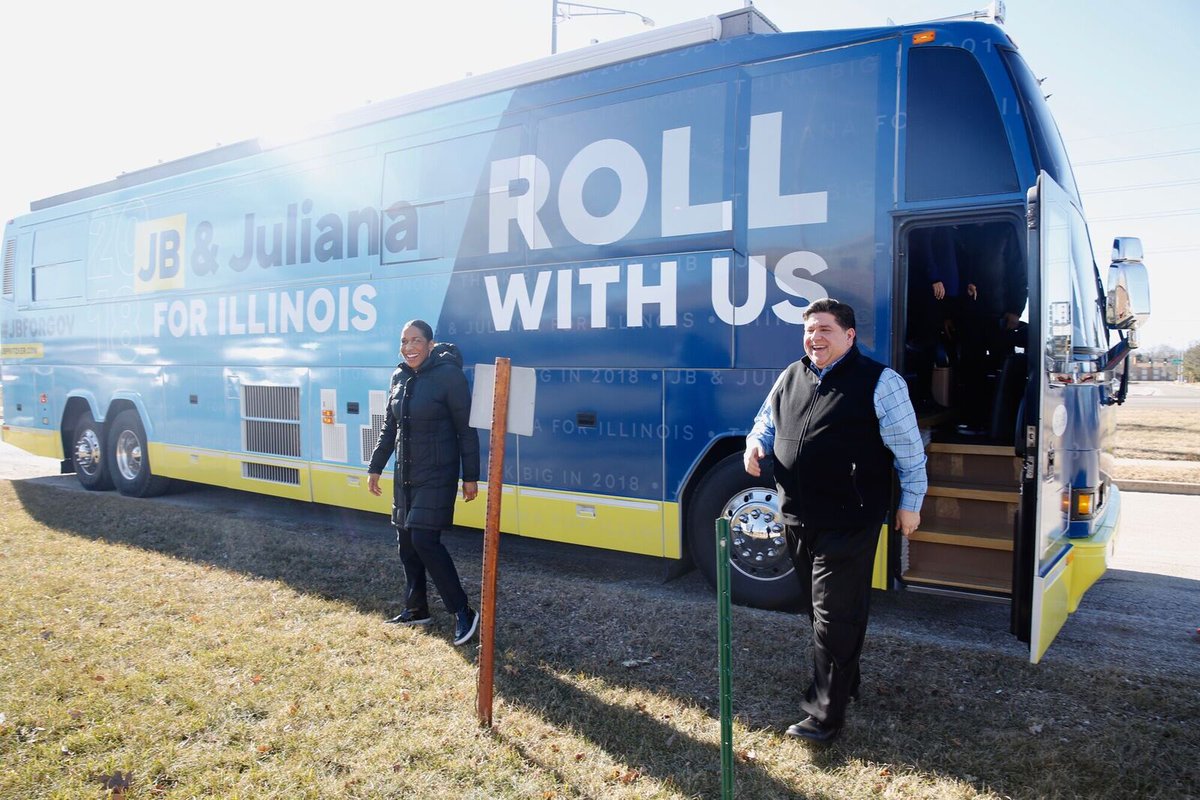Regardless of how you feel about a billionaire clobbering a near-billionaire at the polls, J.B. Pritzker’s victory over incumbent governor Bruce Rauner, and the Democratic party’s strengthened majority in Springfield in the wake of yesterday’s election could be good news for biking, walking, and transit. Today I checked in with local advocates and experts to get their take on what Illinois’ blue wave could mean for the future of sustainable transportation in our state.
Pritzker filled out the Active Transportation Alliance’s candidate questionnaire back in the primary season and voiced support for improving conditions for non-car modes. Some of the initiatives he checked “yes” on included raising state transit funding to pre-2017 levels; building more and better biking and walking facilities on state routes; and creating dedicated transit lanes on North Lake Shore Drive. And while Rauner proposed widening expressways in the Chicago region, Pritzker said he supports state policies that would improve transit and implement rush-hour demand management strategies as an alternative to costly road expansion.
Active Trans director Ron Burke expressed optimism that the new leadership in the governor’s mansion could lead to more equitable and equitable state transportation policies. “Governor-elect Pritzker and the new Illinois General Assembly have a chance to reverse years of neglect of the state’s transportation network by passing an infrastructure bill funded with sustainable and reliable revenue,” he said via email. “A bill with at least 40 percent of transportation spending on public transit projects and at least $50 million (2 percent of the Illinois Department of Transportation budget) for biking and walking would increase mobility and opportunity for all residents… State leaders must recognize that building safer, healthier and more sustainable communities requires upgrading the transportation system, especially in the highest need areas across Illinois.”
Likewise, Metropolitan Planning Council director of transportation Audrey Wennink said the regime change could lead to lawmakers taking long-overdue action to improve the state transportation network. “Governor-elect Pritzker seems to understands the urgent need for increased transportation infrastructure investment and we are hopeful he and the legislature will take action,” she wrote. “This is an opportunity to develop sustainable revenue sources based on user fees that will provide funding on an ongoing basis, not accruing more debt through infrequent bonding programs.”
Wennink added that the incoming administration should prioritize funding multimodal transportation infrastructure including transit, intercity rail, biking, and walking as well as roads. “Younger generations --especially the tech sector -- have clearly signaled that they want transportation choices,” she said. “This is also a critical opportunity to upgrade Illinois’ processes so data-driven decisions are made and transparency on transportation investment priorities is improved. More transportation investments are desperately needed and this is our chance to do this the right way.”
Steve Schlickman, a transportation consultant and former head of UIC's Urban Transportation Institute, also expressed optimism that the new blood in Springfield could lead to bold action to address infrastructure needs. “It is clear that there are tremendous unfunded capital needs for highways and mass transit in our state, particularly in the Chicago area,” he said via email. “We need a capital funding initiative that is greater than anything we have seen before. The governor-elect needs to take the leadership role in making the case for that.”
Schlickman argued that new revenue sources will be needed to pay for transportation infrastructure, and raising the gas tax, which has been stuck at 19 cents a gallon for almost three decades, is the best option. “[Pritzker] needs to make it clear to people what they will get in return. If he does that effectively it should induce the legislature to have the political will to pass the tax increase he proposals.”
So here's hoping that the new administration takes the bull by the horns when it comes to transportation infrastructure funding, and earmarking a fair share of those funds to sustainable modes.
![]()
Did you appreciate this post? Consider making a donation through our PublicGood site.





